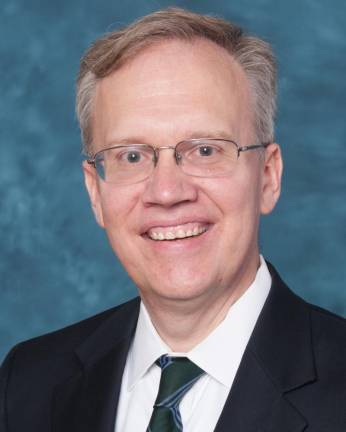OTTY Honoree 2020 Tony Oroszlany: Educating the Whole Person
As an alumnus of the institution he leads, Loyola School President Tony Oroszlany knows how a Jesuit education can enrich students for life.

“I was a little bit nerdy” Tony Oroszlany answers cheerfully when asked about his time as a student at Loyola School. “I loved school. I went on to be a history major in college, so history was likely one of my favorite subjects, but when I was here, I loved math as well. Where I was least talented, though I liked it a lot, was the arts.”
The conversation takes place in Oroszlany’s office on the ground floor of his high school alma mater, which he has led as president since 2011. The space is decorated with memorabilia from Oroszlany’s decades at Loyola School, from pictures of alums attending each other’s weddings to a portrait of Mrs. Oroszlany holding their newborn son that was photographed by Frederick Agnostakis, the school’s director of athletics. Every item evokes a spirit of community and love for Loyola that has grown deeper with time.
The Loyola School mission statement references cura personalis, a Jesuit principle translated as “care for the whole person.” It’s an approach Oroszlany models for his students, showing how Loyola not only honed his math skills and admiration for the arts, but also shaped his principled approach to leadership.
“I often say to say to our students: ‘Now, I also want all of you to go on to be great professional successes and, you know, hopefully you're a great teacher, hopefully a great doctor. You’ll be a great lawyer. Hopefully you're great at finance. But then you recognize that whatever you have, you can help others with as well.’ And our students seem to embrace that message. It's an easier way to go about life, to be honest with you.”
During his tenure as president, Oroszlany has fostered Loyola’s community service programs, which send students out to perform acts of service as far afield as Baltimore and as close to home as the Mary Manning Walsh nursing home on East 56th Street.
After graduating from Loyola in 1987, Oroszlany completed his undergraduate degree at Georgetown University, but the Upper East Side native soon returned to Loyola, joining the staff in 1994 and sticking around for seven years until 2001, during which time he also completed an MBA at Fordham University.
A business degree is a somewhat uncommon step for a school administrator, but it has proven useful. “When I received my MBA ... I wasn't imagining that I'd be the school's leader, but I did recognize that some of what you would learn in receiving an MBA can be applied to not-for-profit management,” Oroszlany says.
He came home to Loyola most recently in 2003, putting his business skills to use as the school’s vice president for advancement and strategic planning before stepping into his current role.
Combining his managerial training and dedication to Loyola’s spirit, Oroszlany has overseen strategic initiatives — including the remodeling of the school’s library, arts facilities, and science labs — that have helped Loyola maintain its competitive edge and holistic tradition.
“The manager I probably lean on the most is the founder of the Jesuits, Saint Ignatius. He just has so many thoughts that are 500 years old that still apply to us every day. He tells students: ‘Go forth and set the world afire.’ So just go out and capture it,” Oroszlany says. “He wants us as educators to influence those who will influence others. That's going to be true a hundred years from now as well.”
While the values remain the same, Oroszlany is far from stuck in the past. Even the teaching of Jesuit principles has evolved to keep up with the times. Since priests, who used to embody the school’s spiritual core, have fallen into short supply since the 1970s and ‘80s, Jesuit schools — including Loyola — have become more proactive in sharing their philosophical foundations, while also celebrating the “added dimension of learning” that comes from welcoming students of other faiths into the school community.
“The world they're going out to is very different ... So let's go back 10 years each go around: Ten years ago, the iPad was just starting. Ten years before that, you're kind of getting used to computers. Ten years before that, you may have had a Bunsen burner. But all of these things are just there. They're being prepared for a different world every step of the way,” Oroszlany says, underlining the importance of evolving with the times.
“So often people see this generation as one who are too dependent upon technology, and I firmly disagree. I really believe that they are ready to lead the world. I think they'll do a better job than we've ever done.”
"Whatever you have, you can help others with as well ... our students seem to embrace that message."